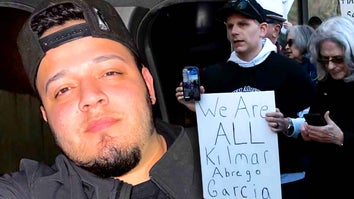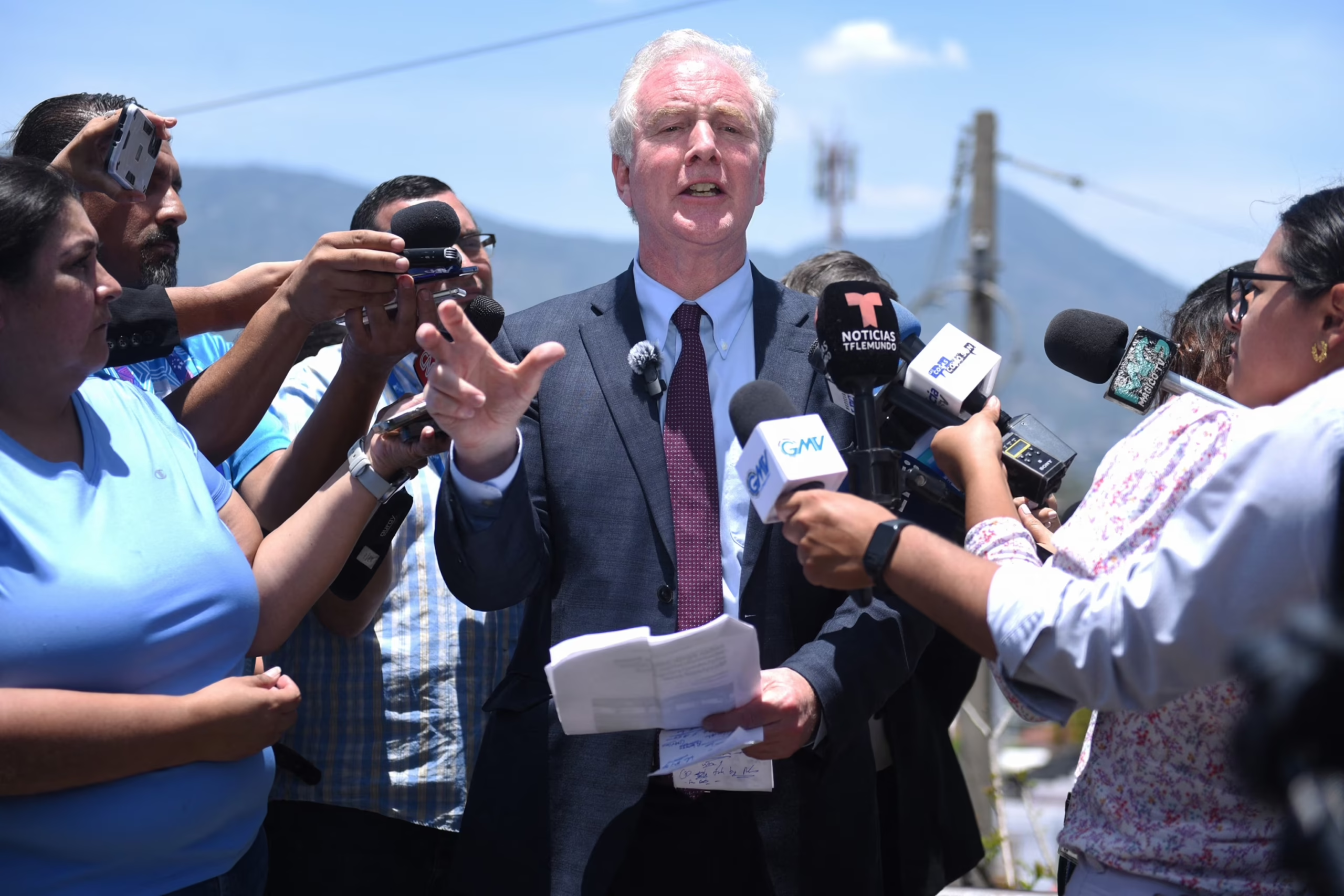A fierce political storm has erupted over the deportation of Kilmar Abrego Garcia, a Maryland resident sent to El Salvador’s notorious Terrorism Confinement Center (CECOT) in March 2025, despite a court order prohibiting his removal. The case, which has drawn sharp criticism from Democratic lawmakers and human rights advocates, has become a flashpoint in the broader debate over the Trump administration’s aggressive immigration policies. White House Press Secretary Karoline Leavitt has defended the deportation, accusing Democrats of siding with a “dangerous criminal,” while Maryland Senator Chris Van Hollen, who met with Abrego Garcia in El Salvador on April 17, insists the deportation was a grave miscarriage of justice.
The Deportation That Sparked Outrage

Kilmar Abrego Garcia, a 29-year-old Salvadoran national who had lived in Maryland since 2011, was deported on March 15, 2025, in what the Trump administration initially called an “administrative error.” Abrego Garcia, a sheet metal apprentice and father to a disabled child, was protected from deportation by a 2019 court order stemming from his asylum status. He had fled El Salvador as a teenager to escape gang violence, according to court filings, and had no criminal convictions in the United States. Yet, on March 12, Immigration and Customs Enforcement (ICE) officers detained him while he was driving with his autistic son, and days later, he was flown to El Salvador without his family’s knowledge.
His wife, Jennifer Vasquez Sura, a U.S. citizen, learned of his fate only after recognizing his tattoos in a press photo of inmates at CECOT, a maximum-security prison known for its harsh conditions. The facility, often criticized for human rights abuses, houses thousands of alleged gang members under El Salvador’s aggressive anti-gang crackdown led by President Nayib Bukele. Abrego Garcia’s deportation violated a federal judge’s order, prompting a legal battle that reached the U.S. Supreme Court, which last week ruled that the administration must “facilitate” his return.
White House Doubles Down
Despite the court’s ruling, the Trump administration has resisted efforts to bring Abrego Garcia back, with Leavitt spearheading a vigorous defense of the deportation. During a heated press briefing on April 16, 2025, Leavitt labeled Abrego Garcia an “illegal alien” and “MS-13 gang member,” accusing Democrats of prioritizing a “foreign terrorist” over American safety. She cited a 2019 police report claiming Abrego Garcia wore clothing with MS-13 symbols and was detained with known gang members, though no charges were filed. Leavitt also pointed to a 2021 civil protective order filed by Vasquez Sura, alleging a domestic altercation, as evidence of his dangerous character.
“There is no Maryland father here,” Leavitt declared, standing alongside Patty Morin, the mother of a Maryland woman murdered in 2023 by a different Salvadoran immigrant. “Kilmar Abrego Garcia is an MS-13 gang member and foreign terrorist who was deported to his home country. If he ever returns to the United States, he will be deported again.” Her remarks, broadcast widely, underscored the administration’s hardline stance, even as critics questioned the lack of concrete evidence tying Abrego Garcia to gang activity.
Democratic Pushback and Van Hollen’s Mission

Democratic lawmakers, led by Senator Chris Van Hollen, have fiercely contested the administration’s narrative. Van Hollen, who represents Maryland, flew to El Salvador on April 16 to advocate for Abrego Garcia’s release. Initially rebuffed by Salvadoran authorities, who denied him access to CECOT and refused phone contact with the detainee, Van Hollen persisted. On April 17, he met with Abrego Garcia in a San Salvador hotel, a meeting first publicized by Bukele on social media.
“I said my main goal of this trip was to meet with Kilmar. Tonight, I had that chance,” Van Hollen posted on X, sharing a photo of the two seated together. “I have called his wife, Jennifer, to pass along his message of love.” The senator emphasized that Abrego Garcia’s deportation violated due process and international law, noting that El Salvador, as a signatory to the International Covenant on Civil and Political Rights, must allow detainees access to legal counsel. Van Hollen accused the Trump administration of attempting to “cover up” the unlawful deportation.
Other Democrats, including Representatives Robert Garcia, Maxwell Frost, and Delia Ramirez, have called for a congressional delegation to visit CECOT, citing concerns about Abrego Garcia’s welfare and broader implications of Trump’s deportation policies. They expressed alarm over the president’s remarks about sending “homegrown criminals” to foreign prisons, raising fears of extrajudicial detentions.
Bukele’s Defiance and El Salvador’s Role
El Salvador’s President Nayib Bukele has further complicated the situation, refusing to release Abrego Garcia despite U.S. court orders. In a mocking post on X, Bukele wrote, “Kilmar Abrego Garcia, miraculously risen from the ‘death camps’ and ‘torture,’ now sipping margaritas with Sen. Van Hollen in the tropical paradise of El Salvador!” He insisted that Abrego Garcia, whom he claims is a confirmed gang member, will remain in Salvadoran custody. Bukele’s stance aligns with his broader anti-gang campaign, which has incarcerated tens of thousands, often with minimal evidence, in CECOT.
The prison, described by human rights groups as a “hellish” facility, has drawn scrutiny for overcrowding, lack of medical care, and denial of legal access. Van Hollen’s initial denial of entry to CECOT contrasted sharply with a recent visit by Republican lawmakers Riley Moore and Jason Smith, who toured the prison and praised its role in detaining “brutal criminals.” The disparity has fueled accusations of selective access based on political alignment.
Legal and Human Rights Concerns
The legal battle over Abrego Garcia’s case has intensified, with a federal appeals court on April 17 rejecting the Trump administration’s attempt to delay facilitating his return. The court condemned the administration’s actions as an attempt to “stash away residents of this country in foreign prisons without the semblance of due process.” U.S. District Judge Paula Xinis, overseeing the case, has demanded daily updates on efforts to retrieve Abrego Garcia, noting the administration’s apparent inaction.
Human rights advocates argue that Abrego Garcia’s case exemplifies the dangers of unchecked deportation policies. “This is a man who was legally protected, had no criminal record, and was torn from his family without notice,” said Chris Newman, a lawyer representing Vasquez Sura. “The administration’s refusal to comply with court orders sets a chilling precedent.” Vasquez Sura, who has not spoken to her husband since his deportation, issued a statement defending him: “Kilmar has always been a loving partner and father. I will continue to demand justice.”
A Polarized Debate
The controversy has deepened partisan divides, with Republicans framing Abrego Garcia as a national security threat and Democrats portraying him as a victim of systemic overreach. Leavitt’s fiery rhetoric, accusing Democrats of ignoring victims like Rachel Morin, has resonated with Trump’s base, while Van Hollen’s trip has galvanized those advocating for immigrant rights. The White House’s release of the 2021 protective order, which Vasquez Sura said was resolved and not indicative of ongoing issues, has drawn criticism for politicizing personal matters.
Public sentiment, as reflected on platforms like X, remains divided. Some users echo Leavitt’s claims, calling Abrego Garcia a “terrorist,” while others, including Senator Bernie Sanders, have labeled the administration’s actions a “blatant lie” and demanded his return. The case has also reignited debates over MS-13’s influence and the accuracy of gang designations, which critics argue are often based on flimsy evidence like clothing or associations.
What Lies Ahead
As the legal and diplomatic standoff continues, Abrego Garcia remains in Salvadoran custody, his fate uncertain. Van Hollen has vowed to keep pressing for his release, while the Trump administration shows no signs of backing down. The case raises broader questions about the balance between immigration enforcement and due process, the role of foreign governments in U.S. deportations, and the human cost of political brinkmanship.
For Vasquez Sura and her children, the fight is deeply personal. “I miss you so much,” she said in a recent press conference, addressing her husband. “We’re doing everything we can to bring you home.” Whether that homecoming will materialize remains an open question, as the clash between U.S. courts, the White House, and El Salvador’s government shows no signs of resolution.